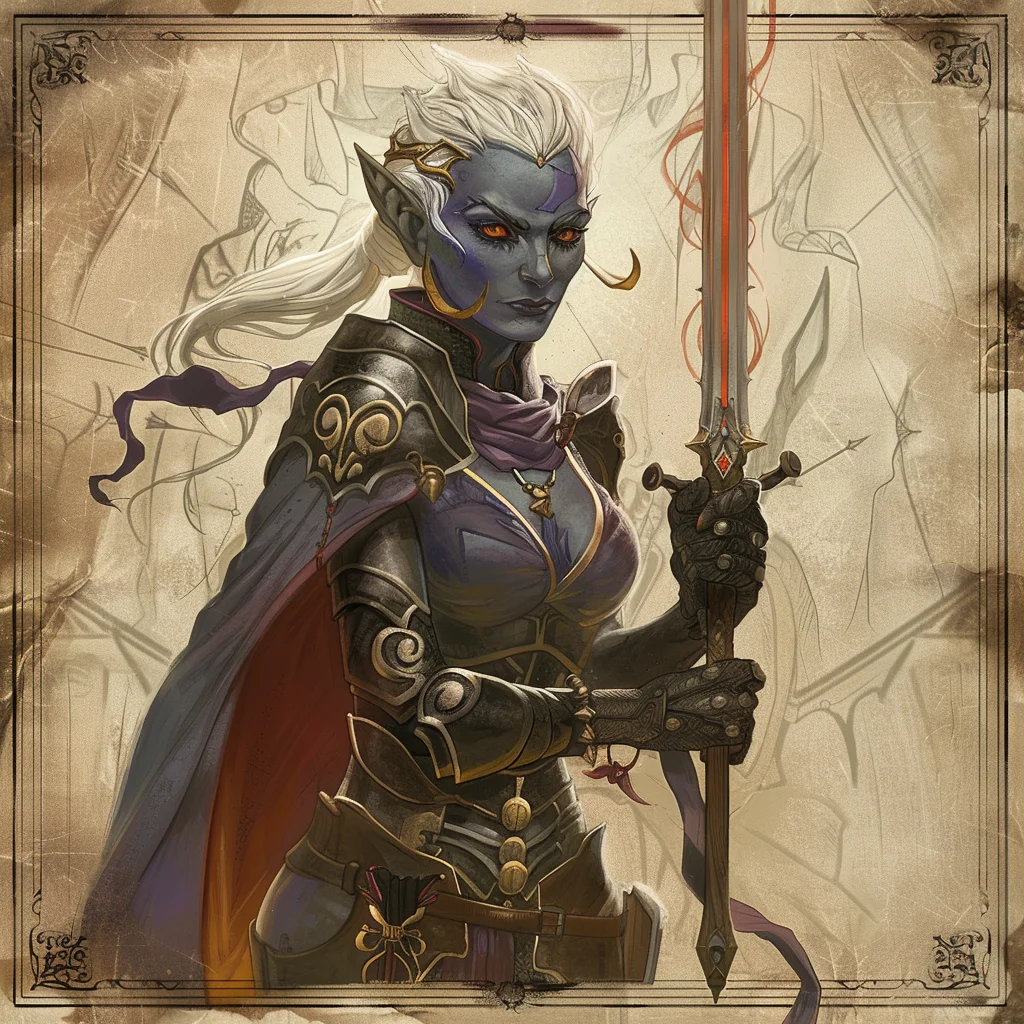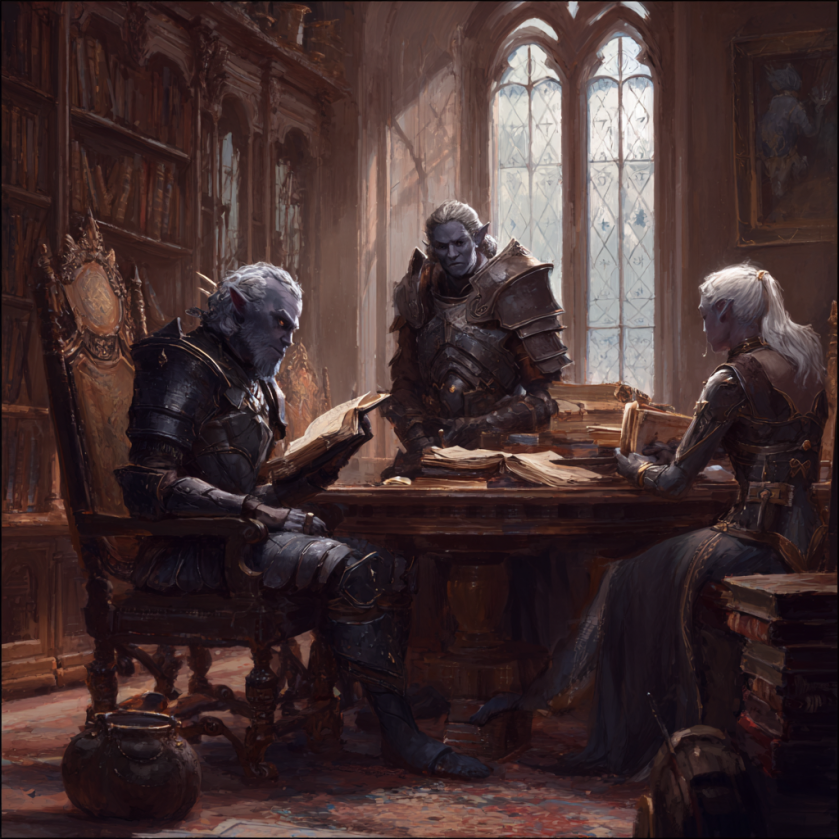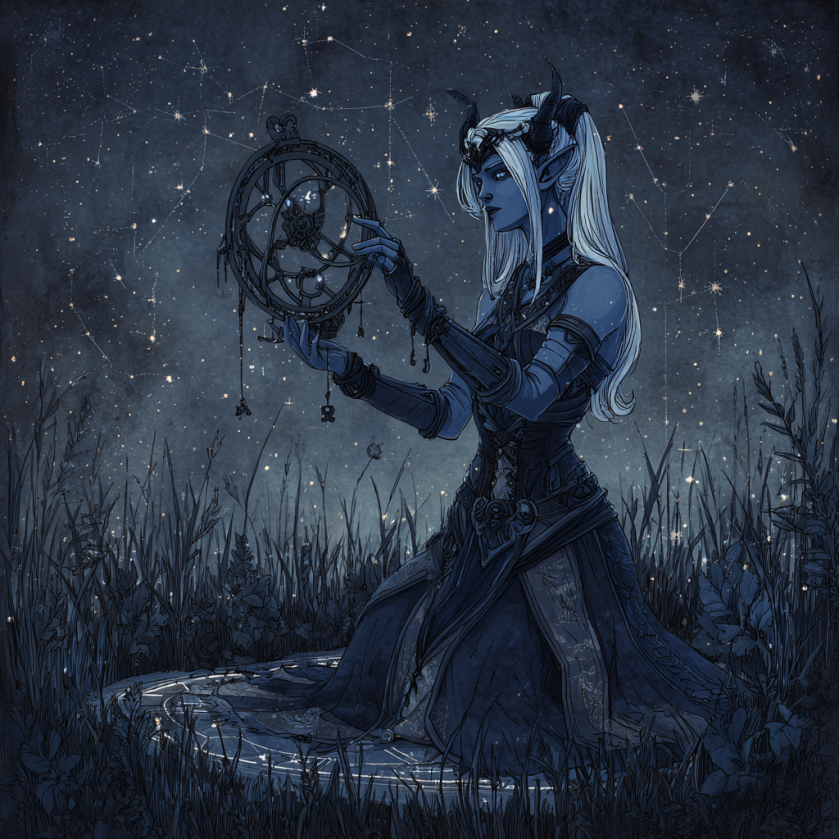Drow
Cultural tastemakers and arcane traditionalists, drow view themselves as the original architects of civilization. Their ancient heritage and sophisticated magical knowledge position them as influential advisors and power brokers throughout The Crescent, though they now concentrate primarily in Ecleptara after the fall of their once-mighty empire.
Physical Characteristics
Drow possess dark skin tones ranging from deep obsidian to dusky gray, with hair typically appearing in shades of white, silver, or pale blonde. Their eyes often carry a luminous quality and come in various colors. Like other elven peoples, they maintain slender, graceful builds that reflect generations of refined living.
Most drow stand between 5'3" and 6'0", reaching full maturity around age 100. Their lifespans extend approximately 400 years, allowing them to accumulate vast stores of knowledge and maintain long-term perspectives on political and cultural developments.
Culture and Governance
Drow society operates through noble houses and arcane councils, maintaining a traditional bias toward female leadership inherited from their matriarchal past. Social status depends heavily on arcane knowledge, political connections, and demonstrated mastery of esoteric arts.
Their communities emphasize intellectual achievement and cultural refinement, with elaborate ceremonies marking advances in magical study or artistic accomplishment. Religious practices center around Mōrga, though individual houses may maintain additional spiritual traditions passed down through generations.
The drow consider themselves civilization's original architects, viewing many current practices as degraded versions of superior ancient methods. This perspective drives their role as cultural advisors, though it sometimes creates tension with peoples who prefer innovation over tradition.
Superior Traditions
Drow certainty that they represent civilization's peak can create friction with other peoples who prefer innovation to restoration.
The tension: When a drow advisor suggests "the proper way" was established millennia ago, or dismisses new solutions as inferior copies of ancient methods, tensions arise quickly.
Other races may see drow cultural guidance as condescending lectures rather than helpful expertise, especially when drow solutions require resources or knowledge that no longer exists.
Traditions
Dial: Celebrated on the 1st of Starfall, this drow tradition honors astronomical alignments and celestial mysteries through elaborate ceremonies. The celebration showcases drow achievements in magic, art, and philosophy, with ritual mystery revelations that demonstrate their mastery of esoteric knowledge.
The Rising: When a drow demonstrates exceptional mastery in their chosen field, their house conducts formal recognition rituals that can last for days, incorporating magical displays and political negotiations.
Relations with Other Peoples
Drow maintain complex relationships across The Crescent, often serving as cultural bridges between peoples while advocating for traditional approaches over modern innovations.
Duergar: Strong mutual respect exists between these peoples, with Duergar appreciating drow arcane expertise and drow valuing duergar's fusion of tradition with magical innovation. Both share underground heritage and sophisticated magical knowledge.
Eldar: Complicated relationships with their elven cousins, as both peoples claim superior understanding of arcane traditions and cultural development. Competition often outweighs cooperation.
Drak'hai: Long-standing tensions dating to ancient conflicts, though modern interactions remain largely civil in major cities and trade centers.
Character Creation Notes
Echoes of Empire
What specific techniques and knowledge died with the Black Empire that drow remember but cannot fully recreate?
Lost mastery:
- Ancient architectural principles that made their cities impregnable
- Magical bindings that held their society together
- Diplomatic methods that maintained order across vast territories
When fragments of this lost knowledge surface in ruins or forgotten texts, what prices are modern drow willing to pay to reclaim their birthright?
Drow characters excel in roles requiring magical knowledge, cultural sophistication, and political awareness. Their long lifespans and traditional perspectives make them natural wizards, sorcerers, and clerics.
Regional Backgrounds: Noble house scholars, arcane researchers, cultural advisors, or diplomatic intermediaries represent common drow paths.
Cultural Integration: Drow characters often possess extensive knowledge of ancient customs and magical traditions, making them valuable consultants when dealing with historical mysteries or cultural negotiations.
Key Motivations: The drive to preserve and restore traditional excellence motivates many drow. What aspects of ancient civilization does your character believe modern society has lost, and how do they work to recover that knowledge?


